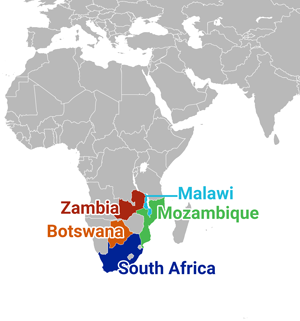Partnerships in Research to Implement and Disseminate Sustainable and Scalable Evidence Based Practices in sub-Saharan Africa (PRIDE SSA)

Leadership

Contact Principal Investigator: Milton Wainberg, M.D.
Principal Investigator: Maria Oquendo, M.D
Hub Activity Sites
Botswana
Malawi
Mozambique
South Africa
Zambia
Project Overview
PRIDE SSA may generate templates for other LMICs (low- and middle- income countries) by conducting a state of the art scale up study in Mozambique and by establishing a collaborative research network of nascent research “seed teams.” Such seed teams, trained by the capacity building component, may work across the region to build capacity and conduct implementation research to sustainably scale-up mental health services. In Mozambique, scale-up research in mental health and substance use disorders will evaluate strategies and costs of scaling up an innovative, integrated, sustainable, stepped-care community approach.
Implementation Research Study
PRIDE SSA will leverage Mozambique’s task-shifting strategy of training psychiatric technicians to provide mental health care. It will also leverage the WHO-funded epilepsy community care program, which was successfully implemented in five provinces and is now primed for scale-up by the Ministry of Health. PRIDE SSA uses a cost-effective approach to redefine work roles without requiring new human resources. Importantly, it comports with the Ministry of Health’s plan to implement prevention and treatment for all mental health conditions, rather than single disorders. The model employs evidence-based practices (e.g. psychopharmacology; interpersonal therapy), that are already in use by psychiatric technicians. The goal is to: (a) establish a sustainable program that is delivered and supervised by non-mental health professionals, and is overseen by mental health specialists; (b) provide community screening, care and/or referrals for all mental health disorders; and (c) use implementation tools to monitor sustainability. This collaborative network aims to scale-up a cost-effective, sustainable program and inform policy.
Research Capacity Building
Capacity-building regional partnerships will leverage well-established capacity building institutions (Foundation for Professional Development; University of the Witwatersrand; Mozambique’s Institute of Health Education and Research) and the Mozambique Fogarty/NIMH Mental Health Implementation Program (partnership: Mozambique [Ministry of Health]; United States [Columbia University; University of Pennsylvania]; and Brazil [Universidade Federal do São Paulo]) to train service providers, investigators and policy-makers from Botswana, Malawi, Mozambique, South Africa and Zambia. Each country will contribute seed teams committed to working together, that include all actors needed to develop, test, implement and sustain community based mental health services using evidence-based practices. These actors include: (1) new researchers to conduct mental health implementation and dissemination research; (2) policy makers to leverage evidence generated by local research to improve and test mental health policies and programs; (3) trainer-of-trainers to prepare staff to deliver adapted evidence-based practices that preserve fidelity; and (4) senior-level faculty to develop university programs to prepare the next generation of investigators. Training comprises synergistic didactics, hands-on research experience designed in partnership local stakeholders, and mentorship from local or United States senior investigators. Lessons learned in the scale-up research will be adapted for research in partner countries and other LMICs.
